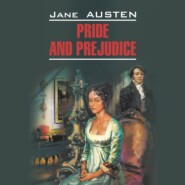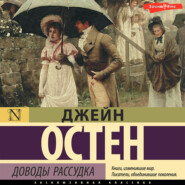По всем вопросам обращайтесь на: info@litportal.ru
(©) 2003-2025.
✖
Pride and Prejudice. Адаптированная книга для чтения на английском языке. Intermediate
Настройки чтения
Размер шрифта
Высота строк
Поля
«You mean, perhaps, the entail of this estate».
«Ah! Yes, sir. It is a sad affair to my poor girls, you must agree. Not that it is your fault; such things I know are all chance in this world. There is no knowing how estates will go when they come to be entailed».
«I am fully aware, madam, of the hardship to my fair cousins, and could say much on the subject, but I don't wish to seem impertinent and hasty. I can assure the young ladies that I come prepared to admire them. At present I will not say more; but, perhaps, when we are better acquainted…»
He was interrupted by an invitation to dinner, and the girls smiled at each other. They were not the only objects of Mr. Collins's admiration. The hall, the dining-room, and all its furniture, were examined and praised. Mrs. Bennet would have been flattered by his admiration if she hadn't thought he was looking at everything as his own future property. The dinner too was highly admired, and he wanted to know which of his fair cousins was so excellent at cooking. But Mrs. Bennet told him rather severely that they were very well able to keep a good cook, and that her daughters had nothing to do in the kitchen. He begged pardon for having displeased her. In a softened tone she said she was not at all offended; but he continued to apologize for about a quarter of an hour.
Chapter 13
While the servants were serving dinner, Mr. Bennet spoke very little, but when they left, he thought it time to have some conversation with his guest. He remarked that Mr. Collins was very fortunate in his patroness. Lady Catherine de Bourgh's attention to his wishes, and concern for his comfort, seemed quite extraordinary. Mr. Bennet could not have chosen better. Mr. Collins became most solemn in his manner and said that «he had never in his life seen such behaviour in a person of rank, such friendliness and condescension, as he had himself experienced from Lady Catherine. She had asked him twice to dine at Rosings. Many people he knew considered Lady Catherine proud, but he had never seen anything but friendliness in her. She had always spoken to him as she would to any other gentleman; she made not the smallest objection to his joining in the society of the neighborhood or to his leaving the parish occasionally for a week or two, to visit his relatives. She had even condescended to advise him to marry as soon as he could, provided he chose with discretion; and had once paid him a visit in his humble abode, where she had perfectly approved all the changes he had been making, and had even condescended to suggest some herself: some shelves in the closet upstairs».
Mrs. Bennet asked if lady Catherine lived near Mr. Collins.
«The garden in which stands my humble abode is separated only by a lane from Rosings Park, her ladyship's residence».
«I think you said she was a widow, sir? Has she any family?»
«She has only one daughter, the heiress of Rosings, and of very extensive property».
Mrs. Bennet then wanted to know what sort of young lady the daughter was, whether she was beautiful.
Mr. Collins said Miss de Bourgh was a most charming young lady indeed, but unfortunately of a sickly constitution, which has prevented her from making that progress in many accomplishments which she could have otherwise achieved, as he was informed by the lady who supervised her education.
«Has she been presented? I do not remember her name among the ladies at court».
«Her poor state of health unhappily prevents her being in town. As I told Lady Catherine one day, that has deprived the British court of its brightest ornament. Her ladyship seemed pleased with the idea; and you may imagine that I am happy on every occasion to offer those little delicate compliments which are always acceptable to ladies».
«You possess the talent of flattering with delicacy», said Mr. Bennet, «and may I ask whether you pay these pleasing compliments on an impulse, or are they the result of previous composition?»
«They arise chiefly from what is passing at the time, and though I sometimes amuse myself with composing such little elegant compliments as may be adapted to ordinary occasions, I always try to make them sound as spontaneous as possible».
Mr. Bennet's expectations were fully answered. His cousin was as absurd as he had hoped, and he listened to him with great enjoyment, keeping at the same time the most serious expression on his face, and only occasionally glancing at Elizabeth.
By tea-time, however, the dose had been enough, and Mr. Bennet was glad to take his guest into the drawing-room again, and, when tea was over, glad to invite him to read aloud to the ladies. Mr. Collins readily agreed, but when a book was produced, he started back and said that he never read novels. Other books were produced, and he chose Fordyce's Sermons. Before he had, with very monotonous solemnity, read three pages, Lydia interrupted him addressing to her mother:
«Do you know, mamma, that my uncle Phillips talks of dismissing Richard, and if he does, Colonel Forster will hire him. I shall walk to Meryton to-morrow to hear more about it, and to ask when Mr. Denny comes back from town».
Mr. Collins, much offended, laid aside his book, and said:
«It's a pity young ladies are so little interested by serious books, though written solely for their benefit. It surprises me, I must say; for, certainly, there can be nothing so advantageous to them as instruction. But I will no longer bore my young cousin».
Mrs. Bennet and her daughters apologized most politely for Lydia's interruption, and promised that it would not happen again, if he would start reading again. But Mr. Collins, assuring them that no offence was taken, turned to Mr. Bennet and offered himself as his partner at backgammon. Mr. Bennet accepted the offer, saying that he acted very wisely in leaving the girls to their own silly amusements.
Chapter 14
The greatest part of his life Mr. Collins had spent under the guidance of an illiterate and mean father. He was not a sensible man, and neither education nor society had been able to improve that natural defect because at university he had simply passed the necessary terms, without forming any useful acquaintance with his fellow students. His father had brought him up in complete subordination, which had given him great servility of manner; but it was now a great deal counteracted by the self-importance of a weak head, living alone, and the feelings of early and unexpected prosperity. A fortunate chance had recommended him to Lady Catherine de Bourgh when the living of Hunsford was vacant; and the respect which he felt for her high rank, and his servility for her as his patroness, in combination with a very good opinion of himself, of his authority as a clergyman, and his right as a rector, made him altogether a mixture of pride and servility, self-importance and humility.
Now that he had a good house and a very sufficient income, he was thinking of getting married, and he thought that his marrying one of the Bennet sisters, if he found them beautiful and pleasant, would be a very suitable, generous, and disinterested on his own part way to make peace with the Longbourn family.
His first choice fell on Jane because she was not only lovely but also the eldest daughter, and Mr. Collins was convinced that it was only right for the senior daughter to be the first to be married. But his plan had to be changed after a tete-a-tete with Mrs. Bennet before breakfast the next morning when she hinted that Miss Bennet was likely to be very soon engaged. So, Mr. Collins changed at once from Jane to Elizabeth, equally next to Jane in birth and beauty. Mrs. Bennet felt that she might soon have two daughters married; therefore, the man whom she could not hear of the day before was now high in her good graces.
After breakfast every sister except Mary agreed to walk to Meryton with Lydia, and Mr. Collins was to accompany them, at the request of Mr. Bennet, who was most anxious to get rid of him, and have his library to himself. In his library he had been always sure of leisure and calm; and though prepared, as he told Elizabeth, to meet with foolishness and conceit in every other room of the house, he wanted to be free from them there. Therefore, he most promptly invited Mr. Collins to join his daughters in their walk.
In Meryton the attention of the young ladies was caught by a young man of most gentlemanlike appearance, whom they had never seen before, walking on the other side of the street with Mr. Denny. Kitty and Lydia, under pretense of wanting something in an opposite shop, led the way across the street, and fortunately gained the pavement just when the two gentlemen had reached the same spot. Mr. Denny addressed them at once, and introduced his friend, Mr. Wickham, who had returned with him the day before from town because he had accepted a commission in their regiment. The young man was handsome, had a good figure, and very pleasing manners. The introduction was followed up on his side by a happy readiness of conversation, a readiness at the same time perfectly correct and unaffected. The whole party were still standing and talking together, when Darcy and Bingley appeared riding down the street. On recognizing the ladies of the group, the two gentlemen came directly towards them, and began the usual polite conversation. Bingley said to Miss Bennet that he was on his way to Longbourn to inquire after her health. Mr. Darcy confirmed it with a bow, and trying not to fix his eyes on Elizabeth, he suddenly saw the stranger. As their eyes met, their faces changed colour, one looked white, the other red. Mr. Wickham, after a few moments, touched his hat – a salutation which Mr. Darcy just condescended to return. Elizabeth saw that strange reaction and was extremely surprised. And, of course, she got curious about the meaning of it.
In another minute, Mr. Bingley and his friend left them and rode on.
Mr. Denny and Mr. Wickham walked with the young ladies to the door of Mr. Phillip's house, and then made their bows. Mrs. Phillips was always glad to see her nieces, and the two eldest, because of their recent absence, were particularly welcome, and she was eagerly expressing her surprise at their sudden return home from Netherfield, when her attention was drawn towards Mr. Collins by Jane's introduction of him. She received him with her very best politeness, which he returned with as much more, apologizing for his intrusion, without any previous acquaintance with her, which, however, might be justified by his relationship to the young ladies who introduced him to her. Mrs. Phillips was impressed by such an excess of good breeding. Her younger nieces were eager to have some information from her about Mr. Wickham, but she could only tell them what they already knew, that Mr. Denny had brought him from London, and that he was to have a lieutenant's commission in the… shire. Some of the officers were to dine with the Phillipses the next day and their aunt promised to make her husband call on Mr. Wickham, and give him an invitation also, if the family from Longbourn would come in the evening. This was agreed to, and they parted in mutual good spirits. Mr. Collins repeated his apologies in leaving the room, and was assured with as much politeness that they were perfectly needless.
Chapter 15
When Mr. Collins and his five cousins arrived at Meryton and were shown into their aunt's drawing room, the girls were pleased to hear that Mr. Wickham had accepted their uncle's invitation, and was then in the house.
While they were waiting for the gentlemen to finish their after dinner drinks in the dining room, Mr. Collins was at leisure to look around him and admire, and he was so much struck with the size and furniture of the room, that he compared it with the small summer breakfast room at Rosings. At first, Mrs. Phillips took offence at such comparison, but when she understood from him what Rosings was, and who was its owner, when she had listened to the description of only one of Lady Catherine's drawing rooms, and found that the chimneypiece alone had cost eight hundred pounds, she felt all the force of the compliment. He found in Mrs. Phillips a very attentive listener, whose opinion of his importance increased with what she heard, and who was going to make it known among her neighbors as soon as she could. To the girls, who could not listen to their cousin, and who only wished to have some music and dancing, the interval of waiting seemed very long. It was over at last, however. The gentlemen appeared, and when Mr. Wickham walked into the room, he was the happy man towards whom almost every female eye was turned, and Elizabeth was the happy woman by whom he finally seated himself. He immediately started conversation, and though it was only on its being a wet night, Elizabeth felt that the dullest topic might be made interesting by the skill of the speaker.
With such rivals for the notice of the fair ladies as Mr. Wickham and the officers, Mr. Collins found at intervals a kind listener in Mrs. Phillips only. When the card-tables were placed, she invited him to play at whist.
Mr. Wickham did not play at whist and was gladly received at the other table between Elizabeth and Lydia. At first it seemed that Lydia would monopolize him completely, but as she was extremely fond of lottery tickets, she soon grew too much interested in the game to have attention for anyone. Mr. Wickham was therefore free to talk to Elizabeth, and she was very willing to hear him. Though she chiefly wished to hear the history of his acquaintance with Mr. Darcy, she dared not even mention that gentleman. Her curiosity however, was unexpectedly satisfied. Mr. Wickham began the subject himself. He asked how far Netherfield was from Meryton, and then, with some hesitation, how long Mr. Darcy had been staying there.
«About a month», said Elizabeth. Then, wishing to hear more on the subject, she added, «He is a man of very large property in Derbyshire, I understand».
«Yes», replied Mr. Wickham; «his estate there is an excellent one. A clear ten thousand a year. No other person can give you more certain information about that than myself, for I have been connected with his family from my infancy».
Elizabeth looked a great deal surprised.
«You may be surprised, Miss Bennet, at this statement, after seeing, as you probably did, the very cold manner of our meeting yesterday. Are you much acquainted with Mr. Darcy?»
«As much as I ever wish to be», cried Elizabeth very emotionally. «I have spent four days in the same house with him, and I find him very unpleasant».
«I have known him too long and too well to be a fair judge», said Wickham. «It is impossible for me to be impartial. But I think your strong opinion of him would astonish other people».
«I can say he is not at all liked in Hertfordshire. Everybody is displeased with his pride. You will not find him more favourably spoken of by anyone».
«I'm afraid», said Wickham, after a short pause, «the world is blinded by his fortune and importance, or frightened by his high and proud manners, and sees him only as he chooses to be seen».
«I think him, even on my slight acquaintance, to be an ill-tempered man». Wickham only shook his head. Then he said he wanted to know whether Mr. Darcy was going to stay at Netherfield much longer. Elizabeth didn't know anything about it, but she hoped that Mr. Darcy's being in the neighborhood would not affect Mr. Wickham's plans.
«Oh! No, I won't be driven away by Mr. Darcy. If he doesn't want to see me, he must go. We are not on friendly terms, and it always gives me pain to meet him, but I have no reason for avoiding him except a sense of very great ill-usage, and most painful regrets at his being what he is. His father, Miss Bennet, the late Mr. Darcy, was one of the best men that ever lived, and the truest friend I ever had. This Mr. Darcy's behaviour to myself has been scandalous, but I think I could forgive him anything and everything except his disappointing the hopes of his father and disgracing his memory».
Elizabeth listened to him with growing interest, but thought it indelicate to ask more questions.
Mr. Wickham turned to more general topics, Meryton, the neighborhood, the society.
«It was the prospect of good society», he said, «that was my chief motive to enter the… shire. I knew the regiment to be a most respectable one, and my friend Denny tempted me even more by his description of a gallant society in Meryton. Society is necessary to me. I have been a disappointed man, and I don't like solitude. I must have work and society. A military life was not my aim in life. I was brought up for the church, and now I would have possessed a very good living if that had pleased the gentleman we were speaking of just now».
«Indeed!»
«Yes, the late Mr. Darcy, in his will, left me the best vacant living as his gift. He was my godfather, and loved me a lot. He was so kind to me. He wanted to provide enough for me, and thought he had done it; but when the living got vacant, it was given elsewhere».
«Ah! Yes, sir. It is a sad affair to my poor girls, you must agree. Not that it is your fault; such things I know are all chance in this world. There is no knowing how estates will go when they come to be entailed».
«I am fully aware, madam, of the hardship to my fair cousins, and could say much on the subject, but I don't wish to seem impertinent and hasty. I can assure the young ladies that I come prepared to admire them. At present I will not say more; but, perhaps, when we are better acquainted…»
He was interrupted by an invitation to dinner, and the girls smiled at each other. They were not the only objects of Mr. Collins's admiration. The hall, the dining-room, and all its furniture, were examined and praised. Mrs. Bennet would have been flattered by his admiration if she hadn't thought he was looking at everything as his own future property. The dinner too was highly admired, and he wanted to know which of his fair cousins was so excellent at cooking. But Mrs. Bennet told him rather severely that they were very well able to keep a good cook, and that her daughters had nothing to do in the kitchen. He begged pardon for having displeased her. In a softened tone she said she was not at all offended; but he continued to apologize for about a quarter of an hour.
Chapter 13
While the servants were serving dinner, Mr. Bennet spoke very little, but when they left, he thought it time to have some conversation with his guest. He remarked that Mr. Collins was very fortunate in his patroness. Lady Catherine de Bourgh's attention to his wishes, and concern for his comfort, seemed quite extraordinary. Mr. Bennet could not have chosen better. Mr. Collins became most solemn in his manner and said that «he had never in his life seen such behaviour in a person of rank, such friendliness and condescension, as he had himself experienced from Lady Catherine. She had asked him twice to dine at Rosings. Many people he knew considered Lady Catherine proud, but he had never seen anything but friendliness in her. She had always spoken to him as she would to any other gentleman; she made not the smallest objection to his joining in the society of the neighborhood or to his leaving the parish occasionally for a week or two, to visit his relatives. She had even condescended to advise him to marry as soon as he could, provided he chose with discretion; and had once paid him a visit in his humble abode, where she had perfectly approved all the changes he had been making, and had even condescended to suggest some herself: some shelves in the closet upstairs».
Mrs. Bennet asked if lady Catherine lived near Mr. Collins.
«The garden in which stands my humble abode is separated only by a lane from Rosings Park, her ladyship's residence».
«I think you said she was a widow, sir? Has she any family?»
«She has only one daughter, the heiress of Rosings, and of very extensive property».
Mrs. Bennet then wanted to know what sort of young lady the daughter was, whether she was beautiful.
Mr. Collins said Miss de Bourgh was a most charming young lady indeed, but unfortunately of a sickly constitution, which has prevented her from making that progress in many accomplishments which she could have otherwise achieved, as he was informed by the lady who supervised her education.
«Has she been presented? I do not remember her name among the ladies at court».
«Her poor state of health unhappily prevents her being in town. As I told Lady Catherine one day, that has deprived the British court of its brightest ornament. Her ladyship seemed pleased with the idea; and you may imagine that I am happy on every occasion to offer those little delicate compliments which are always acceptable to ladies».
«You possess the talent of flattering with delicacy», said Mr. Bennet, «and may I ask whether you pay these pleasing compliments on an impulse, or are they the result of previous composition?»
«They arise chiefly from what is passing at the time, and though I sometimes amuse myself with composing such little elegant compliments as may be adapted to ordinary occasions, I always try to make them sound as spontaneous as possible».
Mr. Bennet's expectations were fully answered. His cousin was as absurd as he had hoped, and he listened to him with great enjoyment, keeping at the same time the most serious expression on his face, and only occasionally glancing at Elizabeth.
By tea-time, however, the dose had been enough, and Mr. Bennet was glad to take his guest into the drawing-room again, and, when tea was over, glad to invite him to read aloud to the ladies. Mr. Collins readily agreed, but when a book was produced, he started back and said that he never read novels. Other books were produced, and he chose Fordyce's Sermons. Before he had, with very monotonous solemnity, read three pages, Lydia interrupted him addressing to her mother:
«Do you know, mamma, that my uncle Phillips talks of dismissing Richard, and if he does, Colonel Forster will hire him. I shall walk to Meryton to-morrow to hear more about it, and to ask when Mr. Denny comes back from town».
Mr. Collins, much offended, laid aside his book, and said:
«It's a pity young ladies are so little interested by serious books, though written solely for their benefit. It surprises me, I must say; for, certainly, there can be nothing so advantageous to them as instruction. But I will no longer bore my young cousin».
Mrs. Bennet and her daughters apologized most politely for Lydia's interruption, and promised that it would not happen again, if he would start reading again. But Mr. Collins, assuring them that no offence was taken, turned to Mr. Bennet and offered himself as his partner at backgammon. Mr. Bennet accepted the offer, saying that he acted very wisely in leaving the girls to their own silly amusements.
Chapter 14
The greatest part of his life Mr. Collins had spent under the guidance of an illiterate and mean father. He was not a sensible man, and neither education nor society had been able to improve that natural defect because at university he had simply passed the necessary terms, without forming any useful acquaintance with his fellow students. His father had brought him up in complete subordination, which had given him great servility of manner; but it was now a great deal counteracted by the self-importance of a weak head, living alone, and the feelings of early and unexpected prosperity. A fortunate chance had recommended him to Lady Catherine de Bourgh when the living of Hunsford was vacant; and the respect which he felt for her high rank, and his servility for her as his patroness, in combination with a very good opinion of himself, of his authority as a clergyman, and his right as a rector, made him altogether a mixture of pride and servility, self-importance and humility.
Now that he had a good house and a very sufficient income, he was thinking of getting married, and he thought that his marrying one of the Bennet sisters, if he found them beautiful and pleasant, would be a very suitable, generous, and disinterested on his own part way to make peace with the Longbourn family.
His first choice fell on Jane because she was not only lovely but also the eldest daughter, and Mr. Collins was convinced that it was only right for the senior daughter to be the first to be married. But his plan had to be changed after a tete-a-tete with Mrs. Bennet before breakfast the next morning when she hinted that Miss Bennet was likely to be very soon engaged. So, Mr. Collins changed at once from Jane to Elizabeth, equally next to Jane in birth and beauty. Mrs. Bennet felt that she might soon have two daughters married; therefore, the man whom she could not hear of the day before was now high in her good graces.
After breakfast every sister except Mary agreed to walk to Meryton with Lydia, and Mr. Collins was to accompany them, at the request of Mr. Bennet, who was most anxious to get rid of him, and have his library to himself. In his library he had been always sure of leisure and calm; and though prepared, as he told Elizabeth, to meet with foolishness and conceit in every other room of the house, he wanted to be free from them there. Therefore, he most promptly invited Mr. Collins to join his daughters in their walk.
In Meryton the attention of the young ladies was caught by a young man of most gentlemanlike appearance, whom they had never seen before, walking on the other side of the street with Mr. Denny. Kitty and Lydia, under pretense of wanting something in an opposite shop, led the way across the street, and fortunately gained the pavement just when the two gentlemen had reached the same spot. Mr. Denny addressed them at once, and introduced his friend, Mr. Wickham, who had returned with him the day before from town because he had accepted a commission in their regiment. The young man was handsome, had a good figure, and very pleasing manners. The introduction was followed up on his side by a happy readiness of conversation, a readiness at the same time perfectly correct and unaffected. The whole party were still standing and talking together, when Darcy and Bingley appeared riding down the street. On recognizing the ladies of the group, the two gentlemen came directly towards them, and began the usual polite conversation. Bingley said to Miss Bennet that he was on his way to Longbourn to inquire after her health. Mr. Darcy confirmed it with a bow, and trying not to fix his eyes on Elizabeth, he suddenly saw the stranger. As their eyes met, their faces changed colour, one looked white, the other red. Mr. Wickham, after a few moments, touched his hat – a salutation which Mr. Darcy just condescended to return. Elizabeth saw that strange reaction and was extremely surprised. And, of course, she got curious about the meaning of it.
In another minute, Mr. Bingley and his friend left them and rode on.
Mr. Denny and Mr. Wickham walked with the young ladies to the door of Mr. Phillip's house, and then made their bows. Mrs. Phillips was always glad to see her nieces, and the two eldest, because of their recent absence, were particularly welcome, and she was eagerly expressing her surprise at their sudden return home from Netherfield, when her attention was drawn towards Mr. Collins by Jane's introduction of him. She received him with her very best politeness, which he returned with as much more, apologizing for his intrusion, without any previous acquaintance with her, which, however, might be justified by his relationship to the young ladies who introduced him to her. Mrs. Phillips was impressed by such an excess of good breeding. Her younger nieces were eager to have some information from her about Mr. Wickham, but she could only tell them what they already knew, that Mr. Denny had brought him from London, and that he was to have a lieutenant's commission in the… shire. Some of the officers were to dine with the Phillipses the next day and their aunt promised to make her husband call on Mr. Wickham, and give him an invitation also, if the family from Longbourn would come in the evening. This was agreed to, and they parted in mutual good spirits. Mr. Collins repeated his apologies in leaving the room, and was assured with as much politeness that they were perfectly needless.
Chapter 15
When Mr. Collins and his five cousins arrived at Meryton and were shown into their aunt's drawing room, the girls were pleased to hear that Mr. Wickham had accepted their uncle's invitation, and was then in the house.
While they were waiting for the gentlemen to finish their after dinner drinks in the dining room, Mr. Collins was at leisure to look around him and admire, and he was so much struck with the size and furniture of the room, that he compared it with the small summer breakfast room at Rosings. At first, Mrs. Phillips took offence at such comparison, but when she understood from him what Rosings was, and who was its owner, when she had listened to the description of only one of Lady Catherine's drawing rooms, and found that the chimneypiece alone had cost eight hundred pounds, she felt all the force of the compliment. He found in Mrs. Phillips a very attentive listener, whose opinion of his importance increased with what she heard, and who was going to make it known among her neighbors as soon as she could. To the girls, who could not listen to their cousin, and who only wished to have some music and dancing, the interval of waiting seemed very long. It was over at last, however. The gentlemen appeared, and when Mr. Wickham walked into the room, he was the happy man towards whom almost every female eye was turned, and Elizabeth was the happy woman by whom he finally seated himself. He immediately started conversation, and though it was only on its being a wet night, Elizabeth felt that the dullest topic might be made interesting by the skill of the speaker.
With such rivals for the notice of the fair ladies as Mr. Wickham and the officers, Mr. Collins found at intervals a kind listener in Mrs. Phillips only. When the card-tables were placed, she invited him to play at whist.
Mr. Wickham did not play at whist and was gladly received at the other table between Elizabeth and Lydia. At first it seemed that Lydia would monopolize him completely, but as she was extremely fond of lottery tickets, she soon grew too much interested in the game to have attention for anyone. Mr. Wickham was therefore free to talk to Elizabeth, and she was very willing to hear him. Though she chiefly wished to hear the history of his acquaintance with Mr. Darcy, she dared not even mention that gentleman. Her curiosity however, was unexpectedly satisfied. Mr. Wickham began the subject himself. He asked how far Netherfield was from Meryton, and then, with some hesitation, how long Mr. Darcy had been staying there.
«About a month», said Elizabeth. Then, wishing to hear more on the subject, she added, «He is a man of very large property in Derbyshire, I understand».
«Yes», replied Mr. Wickham; «his estate there is an excellent one. A clear ten thousand a year. No other person can give you more certain information about that than myself, for I have been connected with his family from my infancy».
Elizabeth looked a great deal surprised.
«You may be surprised, Miss Bennet, at this statement, after seeing, as you probably did, the very cold manner of our meeting yesterday. Are you much acquainted with Mr. Darcy?»
«As much as I ever wish to be», cried Elizabeth very emotionally. «I have spent four days in the same house with him, and I find him very unpleasant».
«I have known him too long and too well to be a fair judge», said Wickham. «It is impossible for me to be impartial. But I think your strong opinion of him would astonish other people».
«I can say he is not at all liked in Hertfordshire. Everybody is displeased with his pride. You will not find him more favourably spoken of by anyone».
«I'm afraid», said Wickham, after a short pause, «the world is blinded by his fortune and importance, or frightened by his high and proud manners, and sees him only as he chooses to be seen».
«I think him, even on my slight acquaintance, to be an ill-tempered man». Wickham only shook his head. Then he said he wanted to know whether Mr. Darcy was going to stay at Netherfield much longer. Elizabeth didn't know anything about it, but she hoped that Mr. Darcy's being in the neighborhood would not affect Mr. Wickham's plans.
«Oh! No, I won't be driven away by Mr. Darcy. If he doesn't want to see me, he must go. We are not on friendly terms, and it always gives me pain to meet him, but I have no reason for avoiding him except a sense of very great ill-usage, and most painful regrets at his being what he is. His father, Miss Bennet, the late Mr. Darcy, was one of the best men that ever lived, and the truest friend I ever had. This Mr. Darcy's behaviour to myself has been scandalous, but I think I could forgive him anything and everything except his disappointing the hopes of his father and disgracing his memory».
Elizabeth listened to him with growing interest, but thought it indelicate to ask more questions.
Mr. Wickham turned to more general topics, Meryton, the neighborhood, the society.
«It was the prospect of good society», he said, «that was my chief motive to enter the… shire. I knew the regiment to be a most respectable one, and my friend Denny tempted me even more by his description of a gallant society in Meryton. Society is necessary to me. I have been a disappointed man, and I don't like solitude. I must have work and society. A military life was not my aim in life. I was brought up for the church, and now I would have possessed a very good living if that had pleased the gentleman we were speaking of just now».
«Indeed!»
«Yes, the late Mr. Darcy, in his will, left me the best vacant living as his gift. He was my godfather, and loved me a lot. He was so kind to me. He wanted to provide enough for me, and thought he had done it; but when the living got vacant, it was given elsewhere».

















